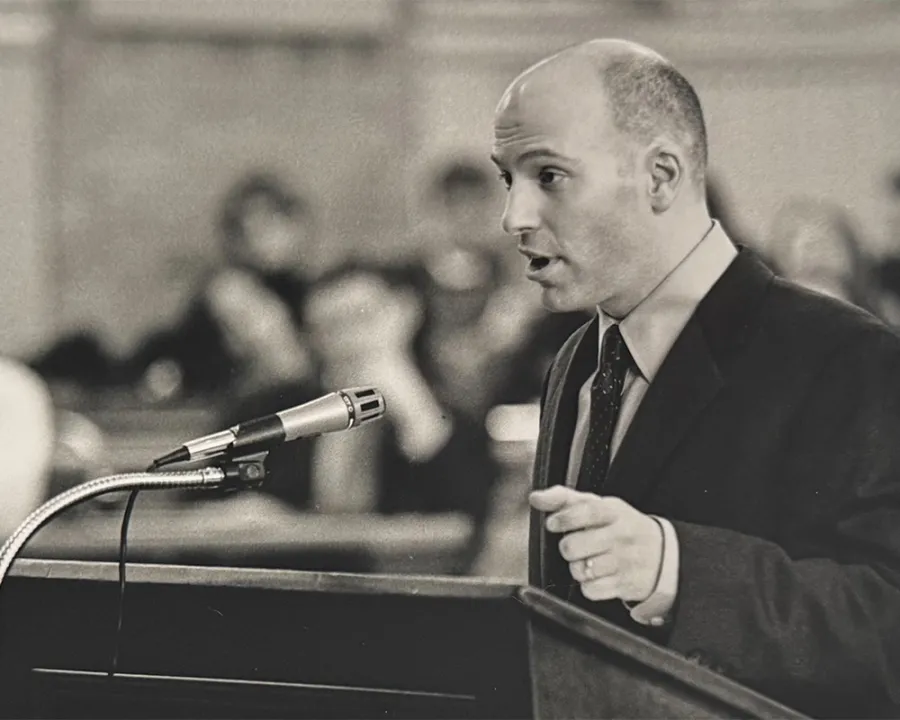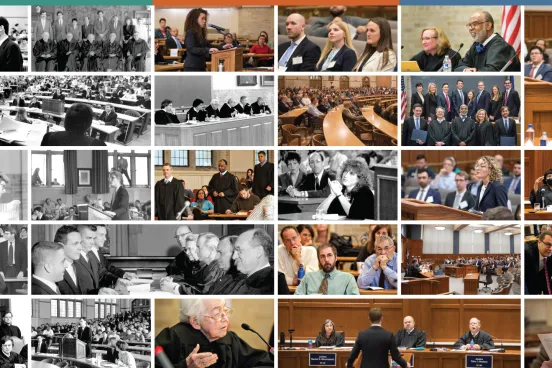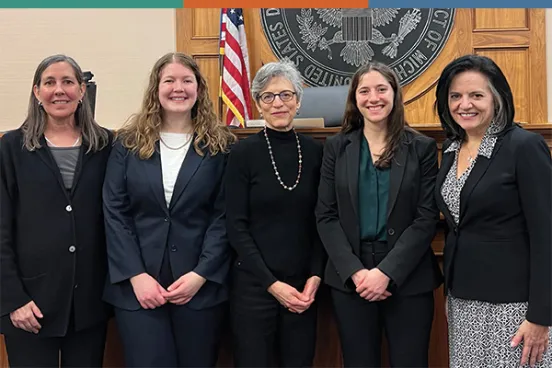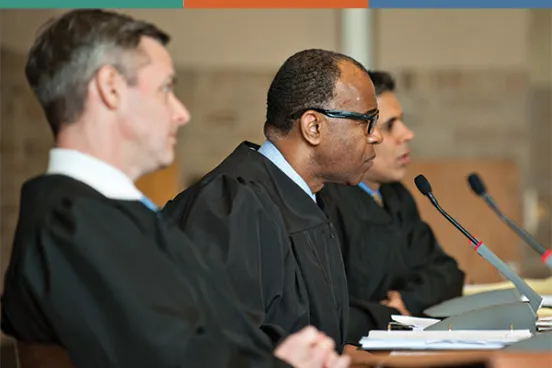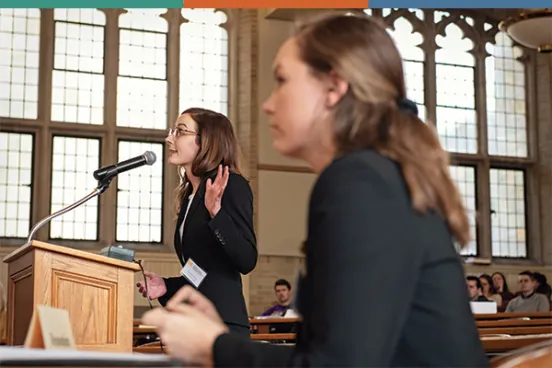The 2002 Campbell Moot Court Competition pitted respondents Catherine M.A. Carroll and John W. Ursu against petitioners Coreen Duffy and Ben C. Mizer—all 2002 graduates of the Law School—to argue a case concerning the First and Fourteenth Amendments in relation to a hate crimes law. Despite the adversarial trappings, the students were linked not only by their success in the early rounds of competition—they also shared close friendships that predated Campbell and endure today.
In the final, the teams argued in front of the Hon. Frank Easterbrook, US Court of Appeals for the Seventh Circuit; the Hon. Stephen Reinhardt, US Court of Appeals for the Ninth Circuit; and the Hon. Barbara Underwood, former acting solicitor general of the United States.
While Carroll and Ursu were the named winners—perhaps aided, all four agree, by the factual merits of the case—they all walked into Hutchins 100 feeling like victors. Competing in the final alongside close friends, and in front of their classmates, community, and family members, was more than enough.
Today, Ursu is a partner at Faegre Drinker, and Carroll practiced at WilmerHale for nearly 20 years before joining the US Department of Justice (DOJ) in 2024. She left the DOJ in January and intends to reenter practice later this year. Mizer served in the DOJ during both the Obama and Biden administrations, most recently as the department’s number three official; he left the DOJ in January and joined Arnold & Porter as a partner in July. And Duffy, who left the practice of law to pursue a career in music and teaching, is an associate professor of conducting and director of choral activities at the University of Colorado Boulder.
Law Quadrangle recently convened the four friends on a videoconference to reflect on the experience, the friendships that defined their law school experiences, and the value of Campbell.
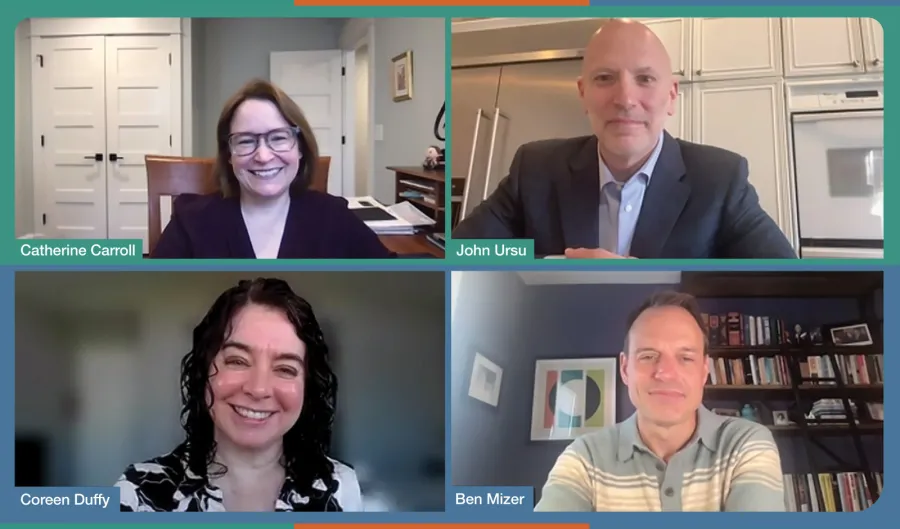
Partnering up
Carroll (respondents): I was interested in Campbell from the get-go. One of the draws of law school, and what I’ve focused on in my career, was the opportunity to stand up and argue—and hopefully win.
Ursu (respondents): I was terrified of Campbell. It was already a tough environment with classes and extracurriculars and trying to find a job. Catherine was my best friend and the only person I would have wanted to partner with.
Mizer (petitioners): I was such a nerd that I had competed in moot court in undergrad. And Coreen and I became very close friends through Headnotes. I already had moot court in my blood, and my recollection was that you proposed that we be teammates. Coreen, is that right?
Duffy (petitioners): Absolutely not. I remember the opposite. It’s quite possible you’re right, it’s a little fuzzy, but I’d be a little shocked if it was me.
Mizer (petitioners): In any event, we were very close friends, and we both wanted to do it.

From the start, cautious optimism
Carroll (respondents): I was hopeful we would do well, but I don’t know if I really had any concept of how it would go and what it would be like. I knew I had a fantastic partner, and I was hopeful that we’d be able to keep going because it was so much fun.
Ursu (respondents): From my perspective, my only job was to be the reasonable face of government. I thought I was partnered with a uniquely gifted oral advocate. We would sit in Hutchins, and I would lob questions at her and it was like putting quarters in the jukebox. I could not believe the stuff that would come out and how well formulated and well thought out it was. So at some point I realized I had accidentally hitched myself to a rock star.
Duffy (petitioners): The best parts of law school for me were extracurriculars, like Headnotes, and I did a legal practice clinic that was a huge highlight. So Campbell was another opportunity to roll up my sleeves and get involved. And talk about being hitched to the wagon of a rock star—I mean, to be paired with Ben Mizer, who is a dear friend and one of the most brilliant minds I’ve encountered, was an honor.
Mizer (petitioners): I thought we would do well because, for all of the over-the-top and untrue things Coreen just said about me, I had a wonderful partner who was brilliant and just such a joy to partner with.
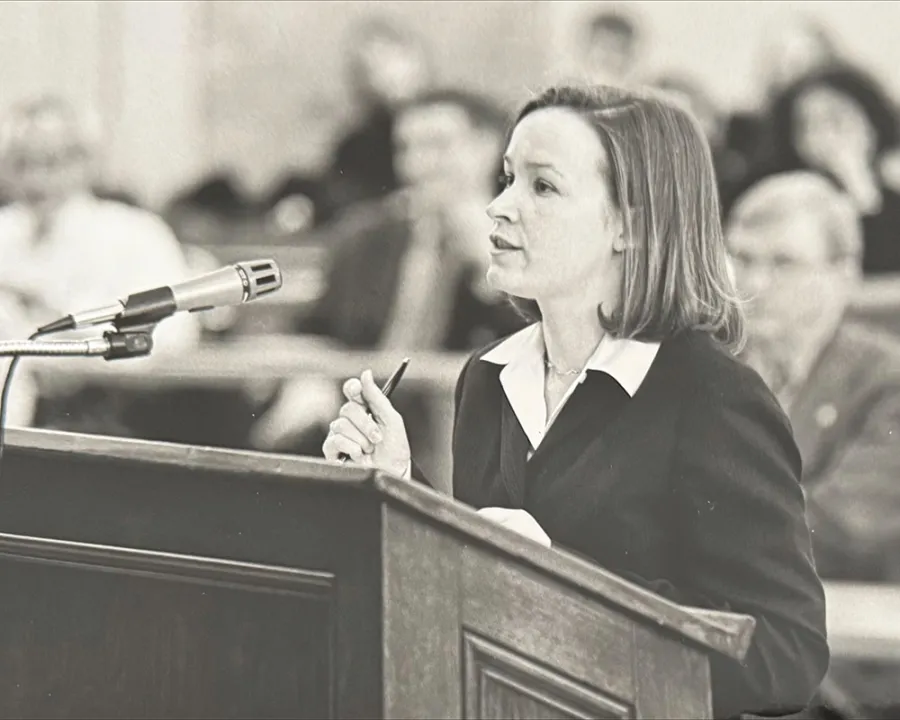

The road to Campbell
Carroll (respondents): I liked law school—I liked reading cases and talking about them, but with Campbell, I felt so much more motivated in reading the case law and understanding nuance. It was a better way to learn how to marshal a factual record and legal authorities in support of advocacy rather than just objectively or critically analyzing them. It felt more exciting to dig into a set of cases when you were going to either try to use them in support of your side or figure out how to downplay or get around them in some way.
Duffy (petitioners): It was such a great opportunity for us to dig in. It was right up my alley versus being presented with a book of case law to read for classes, not to knock the coursework. Campbell was more of a creative endeavor, which I loved.
Ursu (respondents): I think Campbell is the best thing that Michigan Law does. The idea that you have all these interesting and smart people trying to solve a legal problem created by students—it captures the spirit of the Law School better than just about anything else.
Mizer (petitioners): Well, maybe the second best thing, after The Headnotes singing “Rubber Ducky” in your classroom.

Stepping up to the bench
Duffy (petitioners): The night before the final, Ben and I were upstairs in the Law School, and there was some big party or event going on. I don’t remember what the occasion was because I was so wrapped up in Campbell that I had no idea what was going on in the outside world whatsoever. That moment is etched in my brain—it was such a strong disconnect between what we were doing. And of course I was terribly nervous before each round of the competition.
Carroll (respondents): We were super nervous before the final. I still get nervous for oral arguments; I think that’s natural. Making the final was the huge thing to me, just to have that experience in front of federal judges. So I wasn’t nervous so much about the outcome as just wanting to do well and not humiliate myself or my partner. But I was really nervous.
Ursu (respondents): My father was a graduate of the Law School and had participated in the competition himself. And so the fact that we went to the finals and my parents flew out for it—I just don't think I have ever had an experience that is as intense. All your friends are there, and to be in the finals with some of my best friends—it's probably what it feels like to be on the Michigan football team. That was really, really cool. I will say, Catherine and I had a ritual. We would go down to Sub 3, and in one of the offices back there, we would listen to the Rocky soundtrack. And so that’s how we got ready.
Carroll (respondents): I still do that before all arguments—for real!
Mizer (petitioners): That's amazing. That must be your secret sauce. I would echo what Catherine said: I thought that getting to the finals was winning. John and I had become extremely close as the editor in chief and the managing editor of the Michigan Law Review. And Catherine and I were also good friends. I felt that by having this foursome in the finals, we had already won.
I also get nervous, to this day, for every single oral argument and think, especially the night before, “Why am I doing this to myself? This is miserable.” And then during the argument, it’s a blast. So that started with moot court and has remained true for 20 some years.
I also think that the nerves were exacerbated by the fact that my family was there. Apparently I did not do a very good job preparing them for what the argument was going to be like, because they were horrified by the whole thing. They just thought the judges were so mean, and they thought it was terrible. Meanwhile, I was having a blast.
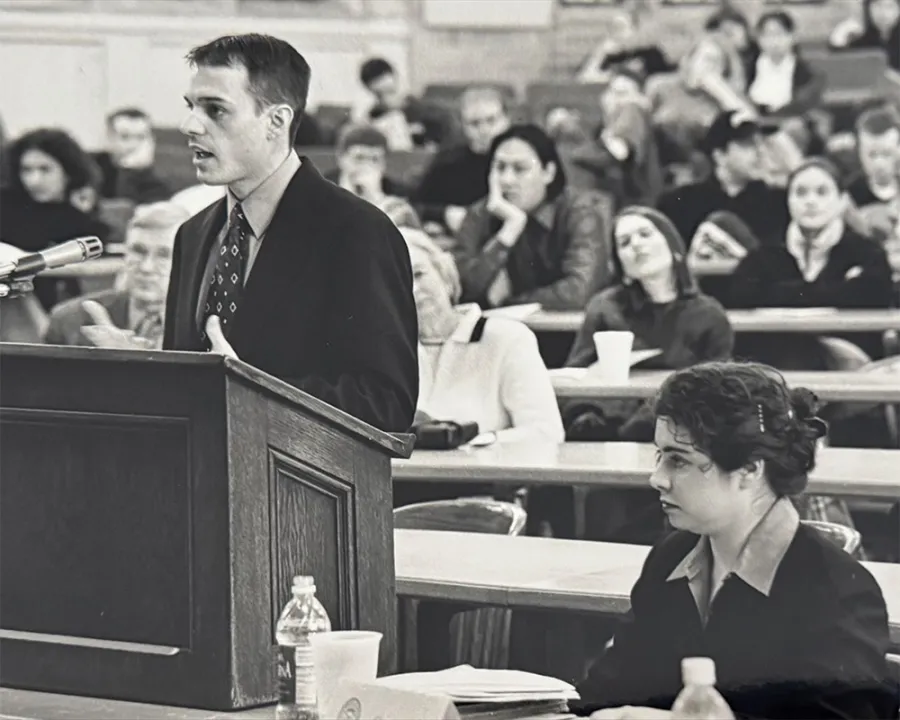

Experiencing a (moot) courtroom
Mizer (petitioners): I had learned in undergraduate moot court that judges are human. We would compete against other schools and often lose to teams that were clearly, in my view, inferior for superficial reasons. That is such good training for being a litigator because you definitely cannot count on judges to get it right.
With respect to competition specifically, I will say I think it's hard for some people who are judging a moot court to understand that they're judging the advocacy and not the legal question. And I think that we experienced this at various points during the competition where judges seemed to favor the advocates who were taking the position that they preferred substantively. That's not how you judge a moot court competition.
Duffy (petitioners): One of the main things I remember is not being allowed to finish a sentence. I felt very much that Judge Easterbrook didn't want to let me get a word in edgewise, which, as a woman, is something I have encountered my entire career. I was trying desperately to be polite and defer to this remarkable panel of judges, but I wish I’d held my ground more.
Mizer (petitioners): I would agree with Coreen about the way that she was treated. I think all four of us felt that John and Catherine probably had the better draw of issues, and I think that Judge Easterbrook, in particular, struggled with separating the substance from the advocates.
Carroll (respondents): I agree that it was coming from his view of the legal issues rather than the advocacy, because I don't think that I got the same treatment as Coreen. I don't remember a whole lot about the actual argument, except that at the very end, Judge Reinhardt was saying something that I couldn’t really understand. I asked him to repeat himself, and he did, but I still didn’t get it. So I just said, “Exactly.” And to this day, I still don’t know what I was agreeing with.
Ursu (respondents): I have very few memories of the event itself other than that Judge Easterbrook had his own take on the First Amendment issue that was different from what Coreen and I had, I think. And he was very convinced by it, is the way I would say it. I did think Catherine’s performance was transcendent, truly beyond almost anything I’ve seen in the law. It was really appropriate that she was named the best oralist.
Another thing I remember is that all the pictures from the final show my hand making this motion, what Catherine and I would call the Spigot of Justice, that I often make when I’m speaking in argument. Every picture is me turning the spigot on and off.

An enduring experience
Mizer (petitioners): Campbell really helped forge these lifelong relationships. Coreen remains such a dear friend, and John and I have stayed in touch over the years. And I’ve been lucky enough to work with Catherine both in private practice and in government, where we together supervised some of the most important cases facing the United States. It didn’t start with Campbell, but Campbell really helped it blossom. And that is priceless.
Ursu (respondents): By the time I got to law school, I was 30. I had been a theater director for seven years. I didn’t expect to be in law school, and I didn't know if I could do it. The confidence I got from my friends and my peers—from people like Ben, Catherine, and Coreen—changed my life.
If I had to choose three individuals to be with on an important thing, I could not ask for better people. I really couldn't. And that is just such a gift for us. You think about law as being tough and all sorts of things like that—screw that. If I have people like you all with me, I think I could do anything.
Duffy (petitioners): I would agree that the people are really what I’ve taken away from Campbell and from law school. I’m still close with my housemates—we recently took a trip to Nashville together. There’s just this bond from law school that is so close. Everyone was ambitious, everybody wanted to do great things, but overall I thought we wanted to work together more than anything else. So for me in my career, being able to build an argument and write persuasively and distill complicated subjects into comments on stage, I can’t emphasize enough how much law school helped me with all of those things. And I would say that Campbell, specifically, helped me express myself clearly.
One of the reasons why I went into choral conducting is that my musical background had been in piano, and I felt like that was way too isolating being in a practice room all the time. So I love ensemble work because you get to roll up your sleeves and work together to make something incredible. Campbell involved a lot of long, memorable hours of working with Ben in that basement apartment in Ann Arbor.
Carroll (respondents): The best part of Campbell and everything else in law school was the chance to work on it together with friends and classmates. Practicing law is about working together with your clients and colleagues to develop a strategy and solve problems. Campbell was one of the best preparations I had for that out of everything that I did in law school.
Ursu (respondents): The last thing I would add is how important those formative experiences are in terms of giving you a sense that you have a voice that is worth something in the law. To have had an experience where, in effect, everyone takes it so seriously and that you’re taken so seriously—it took me 15 years to have experiences like that in practice. It gave me a sense of what’s really good out there in the law, because in the first years you do a lot of stuff that isn’t as great. So Campbell was a real gift.
